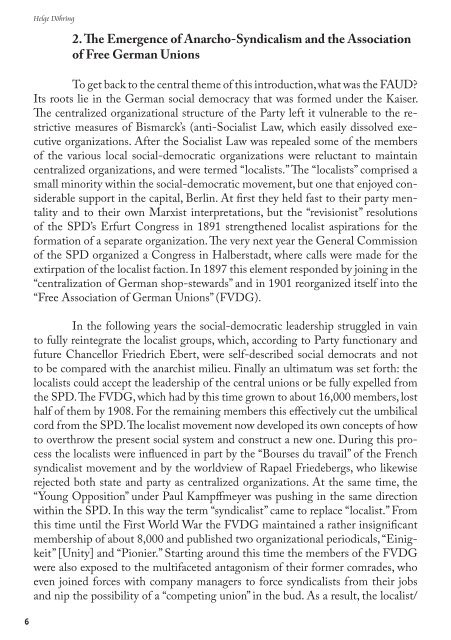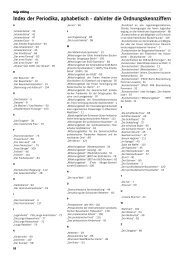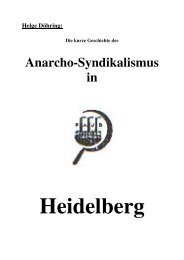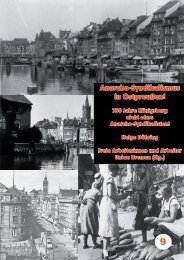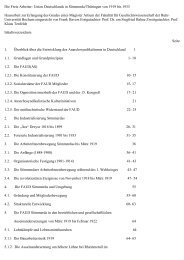Syndicalism and Anarcho-Syndicalism in Germany - Institut für ...
Syndicalism and Anarcho-Syndicalism in Germany - Institut für ...
Syndicalism and Anarcho-Syndicalism in Germany - Institut für ...
- No tags were found...
Create successful ePaper yourself
Turn your PDF publications into a flip-book with our unique Google optimized e-Paper software.
Helge Döhr<strong>in</strong>g2. The Emergence of <strong>Anarcho</strong>-<strong>Syndicalism</strong> <strong>and</strong> the Associationof Free German UnionsTo get back to the central theme of this <strong>in</strong>troduction, what was the FAUD?Its roots lie <strong>in</strong> the German social democracy that was formed under the Kaiser.The centralized organizational structure of the Party left it vulnerable to the restrictivemeasures of Bismarck’s (anti-Socialist Law, which easily dissolved executiveorganizations. After the Socialist Law was repealed some of the membersof the various local social-democratic organizations were reluctant to ma<strong>in</strong>ta<strong>in</strong>centralized organizations, <strong>and</strong> were termed “localists.” The “localists” comprised asmall m<strong>in</strong>ority with<strong>in</strong> the social-democratic movement, but one that enjoyed considerablesupport <strong>in</strong> the capital, Berl<strong>in</strong>. At first they held fast to their party mentality<strong>and</strong> to their own Marxist <strong>in</strong>terpretations, but the “revisionist” resolutionsof the SPD’s Erfurt Congress <strong>in</strong> 1891 strengthened localist aspirations for theformation of a separate organization. The very next year the General Commissionof the SPD organized a Congress <strong>in</strong> Halberstadt, where calls were made for theextirpation of the localist faction. In 1897 this element responded by jo<strong>in</strong><strong>in</strong>g <strong>in</strong> the“centralization of German shop-stewards” <strong>and</strong> <strong>in</strong> 1901 reorganized itself <strong>in</strong>to the“Free Association of German Unions” (FVDG).In the follow<strong>in</strong>g years the social-democratic leadership struggled <strong>in</strong> va<strong>in</strong>to fully re<strong>in</strong>tegrate the localist groups, which, accord<strong>in</strong>g to Party functionary <strong>and</strong>future Chancellor Friedrich Ebert, were self-described social democrats <strong>and</strong> notto be compared with the anarchist milieu. F<strong>in</strong>ally an ultimatum was set forth: thelocalists could accept the leadership of the central unions or be fully expelled fromthe SPD. The FVDG, which had by this time grown to about 16,000 members, losthalf of them by 1908. For the rema<strong>in</strong><strong>in</strong>g members this effectively cut the umbilicalcord from the SPD. The localist movement now developed its own concepts of howto overthrow the present social system <strong>and</strong> construct a new one. Dur<strong>in</strong>g this processthe localists were <strong>in</strong>fluenced <strong>in</strong> part by the “Bourses du travail” of the Frenchsyndicalist movement <strong>and</strong> by the worldview of Rapael Friedebergs, who likewiserejected both state <strong>and</strong> party as centralized organizations. At the same time, the“Young Opposition” under Paul Kampffmeyer was push<strong>in</strong>g <strong>in</strong> the same directionwith<strong>in</strong> the SPD. In this way the term “syndicalist” came to replace “localist.” Fromthis time until the First World War the FVDG ma<strong>in</strong>ta<strong>in</strong>ed a rather <strong>in</strong>significantmembership of about 8,000 <strong>and</strong> published two organizational periodicals, “E<strong>in</strong>igkeit”[Unity] <strong>and</strong> “Pionier.” Start<strong>in</strong>g around this time the members of the FVDGwere also exposed to the multifaceted antagonism of their former comrades, whoeven jo<strong>in</strong>ed forces with company managers to force syndicalists from their jobs<strong>and</strong> nip the possibility of a “compet<strong>in</strong>g union” <strong>in</strong> the bud. As a result, the localist/6


